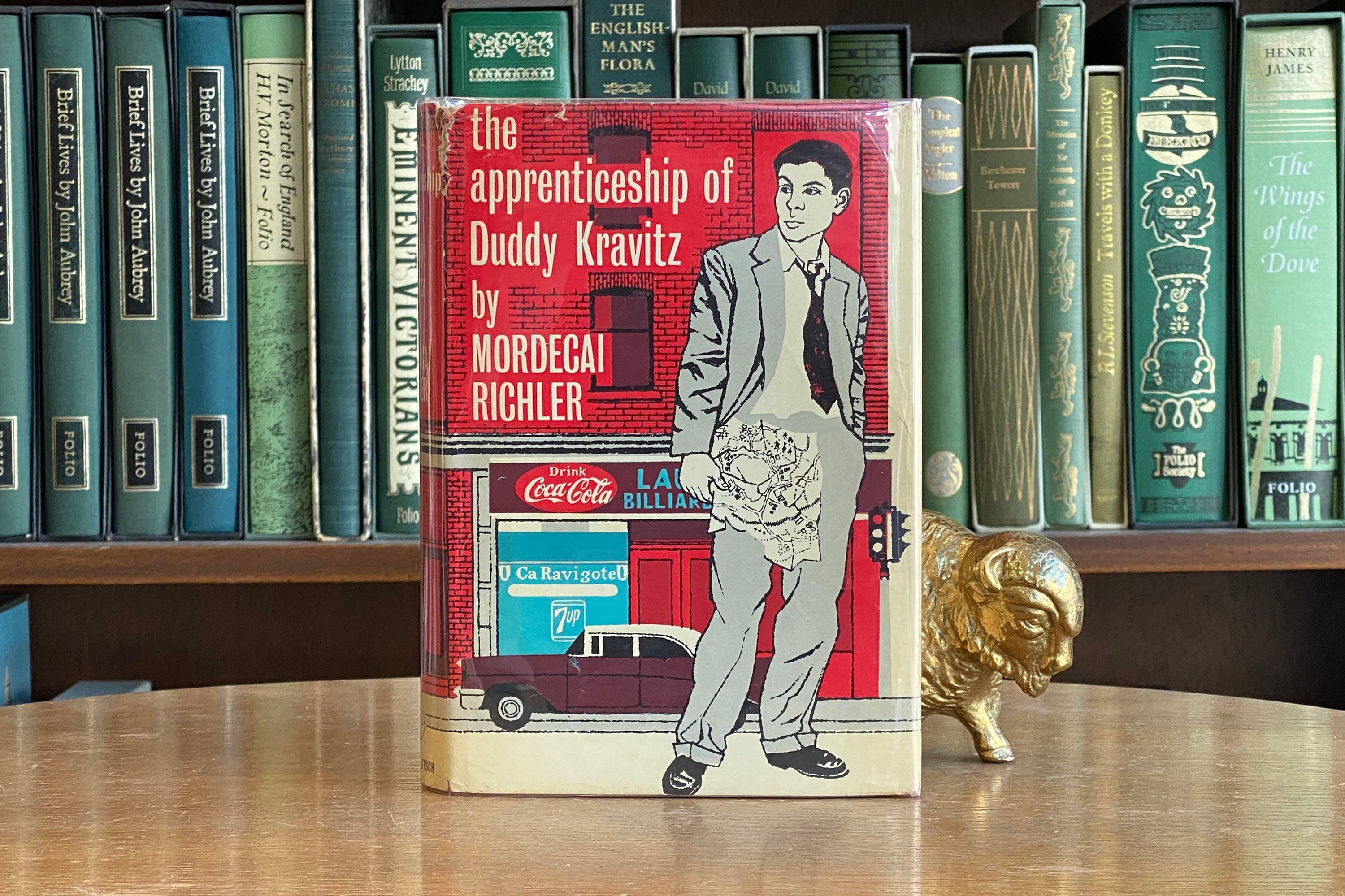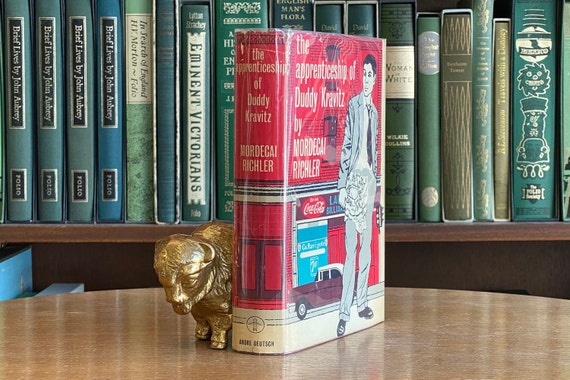The Apprenticeship Of Duddy Kravitz By Mordecai Richler Mordecai Richler’s The Apprenticeship of Duddy Kravitz, published in 1959, is a seminal work of Canadian literature that portrays the complexities of ambition, identity, and moral choice in the context of a rapidly changing society. Set in Montreal, the novel follows Duddy Kravitz, a young, brash, and fiercely ambitious Jewish man who is determined to make a name for himself and secure a future that goes far beyond his humble beginnings.
The novel is a coming-of-age story, exploring Duddy’s personal and professional development as he navigates the moral ambiguities of his ambitions. Throughout his journey, Duddy faces a series of challenges, ethical dilemmas, and life-altering decisions that ultimately shape his identity and future. Richler’s exploration of themes like the pursuit of success, the consequences of selfish ambition, and the clash between personal desires and moral principles makes The Apprenticeship of Duddy Kravitz not only a character study but a social commentary on the nature of success and failure in modern society.
Table of Contents
ToggleSummary of The Apprenticeship of Duddy Kravitz
The Early Years: A Struggle to Belong
Duddy Kravitz, the protagonist of the novel, is a young Jewish boy growing up in the working-class neighborhood of Montreal. From the outset, Duddy’s character is defined by his relentless drive to rise above his modest background. The novel opens with Duddy as a teenager, an ambitious, self-assured boy determined to carve out a future for himself. His father, Max Kravitz, runs a small clothing shop and often reminds Duddy of the importance of money and success, which reinforces the young man’s desire for wealth and recognition.
Duddy’s dreams of success are initially fueled by the example of his uncle, Benjy, a man who is wealthy and well-regarded but also somewhat morally dubious. The one key lesson Duddy learns from his uncle is that “a man’s got to have land” if he wants to be someone in life. This notion becomes Duddy’s central obsession — the pursuit of land as a symbol of wealth, status, and ultimate success.
At the beginning of the novel, Duddy works as a gofer (a general assistant) for a local movie director, Jerry Dingleman. Though he is dismissed by others as being too brash and lacking formal education, Duddy is determined to make his mark. Through this job, he begins to learn about filmmaking and the power of the media, which further stokes his desire to create something lasting and significant.
Read more
Ambition and the Quest for Land
As Duddy matures, his ambition grows. He begins to take on more responsibility, using his wit and determination to seize opportunities that come his way. He quickly learns that in order to gain respect in his community, he needs to make money and create something tangible that demonstrates his success. To Duddy, the path to recognition lies in acquiring land, and he becomes obsessed with the idea of owning a piece of property. This drive leads him to take questionable actions, including using deceit, manipulation, and exploiting others.
One of the key turning points in the novel occurs when Duddy befriends Virgil, a mechanic, and works with him to purchase a piece of land in the Laurentian Mountains. The land, however, is more of a dream than a reality, as it is largely undeveloped and considered worthless by others. But for Duddy, it becomes a symbol of his success — a tangible piece of property that will prove his worth and give him the recognition he so desperately craves.
Duddy’s pursuit of land becomes his obsession, and he is willing to sacrifice almost anything, including his integrity, relationships, and sense of self, in order to achieve his goal. Throughout the novel, he makes choices that reveal the darker side of ambition — where the pursuit of success trumps ethics, loyalty, and even basic human decency.

Conflict and Consequences
As Duddy’s success begins to grow, so do the consequences of his actions. He alienates his family, his friends, and even his romantic partners in his single-minded pursuit of wealth. His relationship with his father, Max Kravitz, becomes strained as Duddy’s disregard for familial values becomes increasingly apparent. Max, who has worked hard his whole life to support the family, becomes disillusioned with his son’s methods and moral disregard.
Duddy’s actions also cause him to lose his relationship with his childhood friend, Yvette, with whom he has a complicated romantic relationship. Duddy’s selfishness and lack of concern for others’ feelings leave a trail of broken relationships and hurt people in his wake. The more he achieves in terms of material success, the more he finds that his personal life is in tatters.
Despite the increasing emotional and ethical toll of his actions, Duddy remains focused on his goal of acquiring land. He becomes involved in shady business deals, using his charm and manipulation to secure the necessary funds. However, as his plans near completion, Duddy faces a harsh reality check. He is forced to confront the consequences of his choices, realizing that his single-minded obsession with land has come at the expense of the relationships and values he once held dear.
In the novel’s climax, Duddy finally acquires the land in the Laurentian Mountains, but the victory feels hollow. He has achieved his goal, but at a great cost. The land, which he once viewed as the ultimate symbol of success, no longer provides the satisfaction he had expected. It is here that Duddy faces a moral reckoning — a moment of self-realization where he must confront the emptiness of his pursuit.
The Final Lesson
In the novel’s conclusion, Duddy is left to grapple with the true meaning of success. While he has achieved his dream of land ownership, he now realizes that the pursuit of material wealth and status is ultimately unfulfilling. Duddy is confronted with the emptiness that accompanies his success and the realization that the relationships and values he sacrificed along the way were far more important than his quest for land.
Ultimately, The Apprenticeship of Duddy Kravitz ends on a note of ambiguity. Duddy has learned a valuable lesson, but the question of whether he will be able to change his ways remains open. The novel leaves readers with a poignant reflection on the cost of ambition and the consequences of pursuing success at the expense of one’s humanity.
Themes in The Apprenticeship of Duddy Kravitz
1. The Corruption of Ambition
One of the central themes of the novel is the corrupting influence of ambition. Duddy’s intense desire to achieve success and escape his working-class roots leads him to make morally questionable decisions. His obsession with acquiring land symbolizes his desire for recognition and respect. However, as Duddy progresses in his quest, he sacrifices his integrity, relationships, and values, highlighting the dangers of unchecked ambition.
Read more
2. The Search for Identity
Duddy Kravitz is also a novel about the search for identity. At the beginning of the story, Duddy is unsure of who he is or where he fits into the world. Throughout the novel, he tries to define himself through his ambition and material success. His search for identity is closely tied to his desire to prove himself to others, especially his father and the people in his community. However, as the novel progresses, Duddy realizes that his external achievements have not brought him the fulfillment he expected, forcing him to confront the question of what truly defines him.
3. The Conflict Between Personal Desire and Social Expectations
The novel also examines the tension between personal desires and societal expectations. Duddy’s pursuit of success is shaped by the values and pressures of his Jewish community, which places great importance on wealth, status, and reputation. His determination to rise above his station is partly motivated by a desire to prove himself to others and gain acceptance in a society that often marginalizes him. The tension between Duddy’s personal desires and the expectations placed upon him reveals the complex dynamics of class, culture, and identity in post-war Montreal.
4. Moral Ambiguity and Consequences
Richler’s novel also explores the theme of moral ambiguity. Duddy is not portrayed as a straightforward villain or hero; rather, he is a complex character whose actions and motivations are shaped by both his strengths and weaknesses. The consequences of his choices — the loss of relationships, his ethical compromises, and his emotional isolation — underscore the idea that success can come at a steep price. The novel suggests that the pursuit of self-interest can lead to moral disillusionment and personal ruin.

Conclusion
Mordecai Richler’s The Apprenticeship of Duddy Kravitz offers a compelling exploration of ambition, identity, and the costs of pursuing success at all costs. Through the story of Duddy Kravitz, the novel raises important questions about what defines a successful life and whether material wealth can ever replace the value of relationships and personal integrity. Richler’s sharp social commentary, complex character development, and nuanced exploration of moral dilemmas make The Apprenticeship of Duddy Kravitz a timeless work that continues to resonate with readers today.
Read more
1. What is the significance of Duddy Kravitz’s obsession with land?
Duddy’s obsession with land represents his desire for success and recognition. In the context of the novel, land symbolizes wealth, status, and identity. For Duddy, owning land is a way to prove that he has transcended his working-class origins and can claim a place in the world. However, his obsession with land ultimately leads to his moral downfall, illustrating the destructive consequences of placing too much value on material possessions and social status.
2. How does Duddy’s relationship with his father, Max Kravitz, evolve throughout the novel?
At the beginning of the novel, Duddy’s relationship with his father is one of respect and admiration, but it is also marked by a certain tension. Max Kravitz is a hardworking, practical man who emphasizes the importance of money and success, which influences Duddy’s ambitions. However, as Duddy becomes more consumed by his quest for land, his relationship with his father deteriorates. Max becomes disillusioned with his son’s increasingly ruthless methods, and their bond becomes strained.
3. What does the novel suggest about the nature of success?
The Apprenticeship of Duddy Kravitz suggests that success is not merely about achieving wealth or material goals. While Duddy does achieve his dream of owning land, he is left emotionally empty and disconnected from the people who matter most to him. The novel emphasizes the idea that success, when pursued at the expense of ethical principles and human connection, can be ultimately unsatisfying.
Read more
















